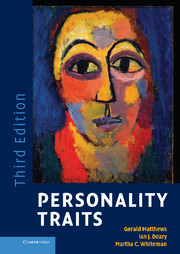Book contents
- Frontmatter
- Contents
- List of figures
- List of tables
- List of boxes
- Preface to the third edition
- Preface to the second edition
- Preface to the first edition
- Part I The nature of personality traits
- Part II Causes of personality traits
- Part III Consequences and applications
- 9 Stress
- 10 Traits and health
- 11 Abnormal personality traits?
- 12 Personality, performance and information processing
- 13 Applications of personality assessment
- 14 Conclusions
- References
- Author index
- Subject index
- References
11 - Abnormal personality traits?
Published online by Cambridge University Press: 05 June 2012
- Frontmatter
- Contents
- List of figures
- List of tables
- List of boxes
- Preface to the third edition
- Preface to the second edition
- Preface to the first edition
- Part I The nature of personality traits
- Part II Causes of personality traits
- Part III Consequences and applications
- 9 Stress
- 10 Traits and health
- 11 Abnormal personality traits?
- 12 Personality, performance and information processing
- 13 Applications of personality assessment
- 14 Conclusions
- References
- Author index
- Subject index
- References
Summary
Dimensions of personality describe variations in behavioural dispositions in the population. Because most personality dimensions are normally distributed, it is easy to assume that ‘abnormality’ lies at the tails of the distributions. For example, people with very high neuroticism scores might suffer much from anxiety, and those with very high conscientiousness scores might be disablingly rigid. However, might there be qualitative, as opposed to statistical, differences between the bulk of the population and a few individuals with very unusual personalities? The concept of personality disorder or abnormal personality lies within the domain of psychiatry and clinical psychology. Strangely, although it alludes to human personality variation, until the 1990s personality disorder attracted relatively little interest from differential psychologists studying normal personality. Conversely, the largely medically oriented researchers in the field of personality disorders have until recently shown little interest in either normal personality dimensions or the techniques of differential psychology.
Instead of benefiting from progress in the taxonomy of normal personality traits, psychiatric nosologists turned to medicine and biology rather than psychology for models for classifying psychopathology. They continue to do so because the philosophical assumptions underlying current psychiatric nosology stipulate that psychiatry is a branch of medicine, that discrete categories of mental disorder exist, and that there is a clear distinction between normality and pathology.
(Livesley, 2001b, pp. 278–9)It is commonplace for books on personality to make little or no mention of the research on personality disorders, let alone try to integrate normal and abnormal personality research, though there are exceptions (Larsen and Buss, 2006).
- Type
- Chapter
- Information
- Personality Traits , pp. 323 - 356Publisher: Cambridge University PressPrint publication year: 2009



